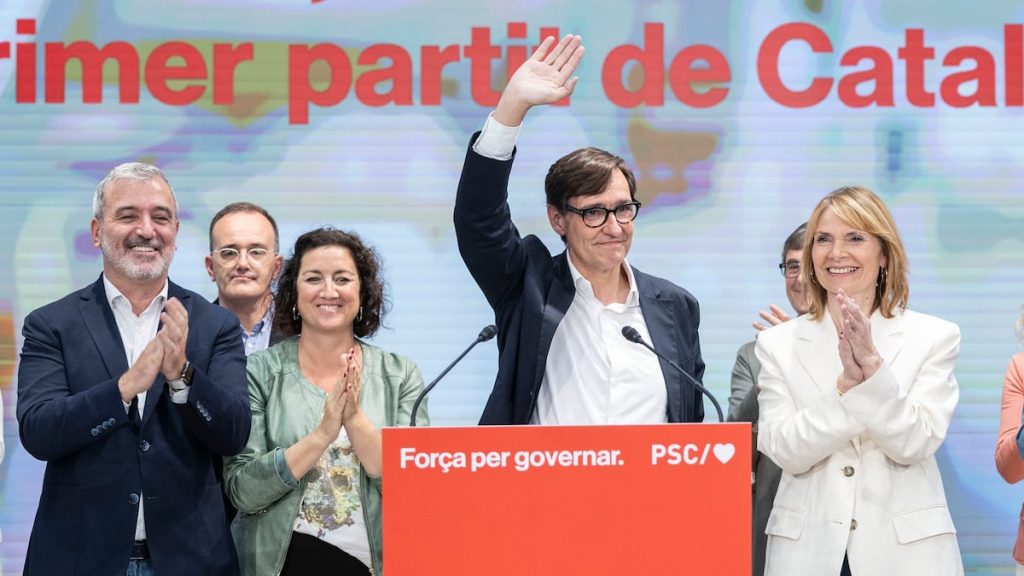The PSC won the Catalan elections last night with Salvador Illa at the helm. The Catalan socialists have an absolute majority for a left-wing tripartite with ERC (which is plummeting) and the commons, who are losing strength, in a result that weakens Yolanda Díaz and her Sumar project. The outcome buries the independence process and strengthens the President of the Government, Pedro Sánchez. Carles Puigdemont manages to place second, but the independence parties do not have a majority for the first time since 1984, not even with the two seats of Aliança Catalana that enter the Catalan Parliament, the first of the 17 autonomous communities to have two far-right parties.
The PSC has won the Catalan elections for the second time with Salvador Illa as the candidate and improving the result. They have gained nine more seats (from 33 to 42) and 200,000 more votes than in 2021. This time they have won in both votes and seats, and the socialists declare the independence process buried. Illa stated that it is up to the PSC to lead this new stage. The party could potentially form a left-wing tripartite or a coalition with Junts. The two combinations add up to an absolute majority, with 68 seats. However, ERC announced that they are willing to move to the opposition after their setback. The results open up various possibilities for alliances, with many weeks ahead before any decisions are made.
The independence movement loses its absolute majority in the Catalan Parliament for the first time since 1984. The parties that advocate for independence have gained a majority in the previous four autonomous elections but have now fallen short. Pere Aragonès, from ERC, acknowledged the poor results and announced that his party would move to the opposition, signaling a potential alliance between PSC and Junts instead. Aragonès emphasized that the public has spoken against the negotiation process and that it is time for a new leadership to take charge. The future of Aragonès and Oriol Junqueras within ERC remains uncertain following the election outcome.
The victory of the PSC and Salvador Illa has further boosted Pedro Sánchez and the PSOE. The electoral campaign was marked by uncertainties and challenges, particularly with the unexpected withdrawal of Pedro Sánchez due to personal reasons at the start of the campaign. Despite this, Illa’s campaign benefited from the support of Sánchez, which contributed to the party’s success. The growth of the PSC is also seen as a positive sign for the Spanish Socialist Party at the national level. The strong performance of the PSC in Catalonia may influence the dynamics of the national government, where Sánchez relies on the support of both ERC and Junts.
The Catalan elections also saw the rise of the PP at the expense of the disappearance of Ciudadanos and surpassing VOX. The PP quadrupled its seats and emerged as the fourth-largest party in the Parliament. This growth was partly due to the decline of Ciudadanos, which suffered a rapid downfall in two consecutive elections. The PP engaged in a fierce competition with VOX, both parties employing populist and xenophobic rhetoric to attract voters. The emergence of Aliança Catalana, a far-right party advocating for independence and anti-immigrant sentiment, adds a new dynamic to the political landscape, becoming the second ultra-right party in the Catalan Parliament alongside VOX.
The outcome of the Catalan elections has implications not only for Catalonia but also for the national government and the City of Barcelona. The potential alliances between parties in Catalonia may affect the governance of the city and the relationships between different political forces. The victory of the PSC and the challenges faced by ERC and other independence parties will shape the future dynamics of Catalan politics and influence the relations between the regional and national governments. The results highlight the shifting political landscape in Catalonia and the complex alliances that may emerge in the coming weeks and months.


